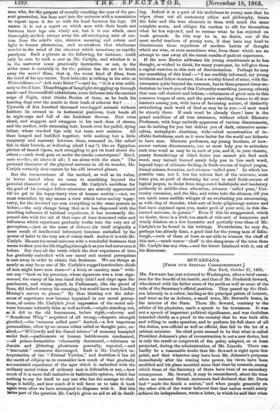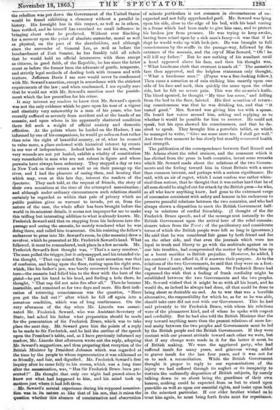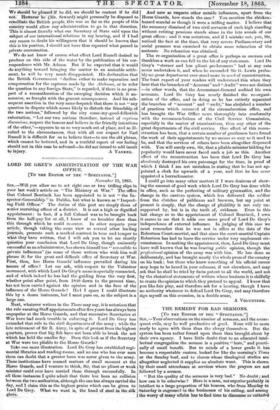SEWARDANA.
'FROM OUR SPECIAL CORRESPONDENT.] New York, October 27, 1865. MR. SEWARD has just returned to Washington, after a brief excur- sion for the benefit of his health, and that of Mr. Frederick Seward, who shared with his father some of the perils as well as some of the toils of the Secretary's official position. They passed up the Hud- son leisurely in a cutter, landing at the principal points of interest, and went as far as Auburn, a small town, Mr. Seward's home, in the interior of the State. There Mr. Seward, contrary to the advice of his physician, made a speech to his townsmen. It was not a speech of important political significance, and was doubtless intended chiefly as a proof to the country that he was both able and willing to make speeches, and to perform his full share of all the duties, non-official as well as official, that fall to the lot of a cabinet minister. Its chief point seemed to be that what is called President Johnson's plan of reconstruction is not a new device, but is only the result or outgrowth of the policy adopted, or at least projected, during the administration of Mr. Lincoln. There can hardly be a reasonable doubt that Mr. Se ward is right upon this point, and that whatever may have been Mr. Johnson's purposes immediately after his coming into power, his views have been modified and his plans moulded since that time by counsels, among which those of the Secretary of State have been of no secondary consequence. Mr. Seward, it may be remembered, about the time when an eminent British statesman had declared that Mr. Davis had " made the South a nation," and when people generally on the other side of the water believed that that nation would surely achieve its independence, wrote a letter, in which he said that when
the rebellion was put down the Government of the United States would be found exhibiting a clemency without a parallel in history. His foresight has in this respect, as well as in others, been verified, and be himself has exercised no small influence in bringing about what he predicted. Without ever flinching for a moment upon the point of absolute surrender, moral as well as physical, on the pea of the slaveholders, and although since the surrender of General Lee, as , well as before the bombardment of Fort Sumter, he has frankly told all rebels that he would hold no official intercourse with them except as citizens, in good faith, of the Republic, he has since the latter event as before the former been the advocate of gentle, temperate, and strictly legal methods of dealing both with treason and with traitors. Jefferson Davie I am sure would never be condemned with Mr. Seward's sanction, except in accordance with the strictest requirements of the law ; and when condemned, I.am equally sure that he would not with Mr. Seward's sanction meet the punish- ment which the law prescribes for his crime.
It may interest my readers to know that Mr. Seward's speech was not the only evidence which he gave upon his tour of a vigour and elasticity very noteworthy in a man of his years, who has recently suffered so severely from accident and at the hands of an assassin, and upon whom in his apparently shattered condition there fell such a weight of official anxiety and domestic affliction. At the points where he landed on the Hudson, I am informed by one of his companions, he would go miles on foot rather than miss the sight of beautiful scenery, or of, what he seemed to value more, a place endowed with historical interest by events in our war of independence. Indeed both he and his son, whose very wounds are not yet healed, exhibit a vitality of constitution very remarkable in men who are not robust in figure and whose pursuits have always been sedentary. They stopped a day or two in New York on their return as well as on their passage up the river, and I had the pleasure of seeing them, and hearing that which may, even at this late day, interest the readers of the Spectator. They each told, at the request of friends, the story of their own sensations at the time of the attempted assassination ; and although under ordinary circumstances such relations should certainly be regarded as within that pale of privacy which no public position gives us warrant to invade, yet as, from the nature of the case, the whole affair has been brought before the world in its minutest details, it seems not improper for me to make this trifling but interesting addition to what is already known. Mr. Frederick Seward said that on stepping from his bedroom into the passage and seeing the assassin, he merely wondered what he was doing there, and called him to account. On his resisting the fellow's endeavour to press into Mr. Seward's room, he (the assassin) drew a revolver, which he presented at Mr. Frederick Seward's head. What followed, it must be remembered, took place in a few seconds. Mr. Frederick Seward's first thought was, " That's a navy revolver." The man pulled the trigger, but it onlysnapped, and his intended vic- tim thought, " That cap, missed fire." His next sensation was that of confusion, and being upon the floor, resting upon his right arm, which, like his father's jaw, was barely recovered from a bad frac- ture—the assassin had felled him to the floor with the butt of the pistol—he put his hand to his head, and finding a bole there, he thought, " That cap did not miss fire after all." Then he became insensible, and remained so for two days and more. His first indi- cation of returning consciousness was the question, "Have you got the ball out ?" after which he fell off again into a comatose condition, which was of long continuance. On the very afternoop of , the day when Mr. Lincoln was assassi- nated Mr. Frederick Seward, who was Assistant-Secretary of State, had asked his father what preparation should be made for the presentation of Sir Frederick Bruce, which was to take place the next day. Mr. Seward gave him the points of a reply to be made to Sir Frederick, and he laid the outline of the speech upon the President's table, and, as I have previously informed my readers, Mr. Lincoln that afternoon wrote out the reply, adopting Mr. Seward's suggestions, and thus preparing that reception of the British Minister by President. Johnson which was regaxded at the time by the people to whose representative it was addressed as so friendly, and fair, and dignified, Mr. Frederick Seward's first inquiry after he came fully to his senses, which was a long time after the assassination, was, " Has Sir Frederick Bruce been pre- sented ?" He thought that only one night had passed since.he knew not what had happened to him, and his mind took up matters just where it had left them.
Mr. Seward's mental experience during his supposed assassina- tion was in its nature so like that of his son, that it raises the question whether this absence of consternation and observation
of minute particulars is not common in circumstances of un- expected and not fully apprehended peril. Mr. Seward was lying upon his side, close to the edge of his bed, with his head resting in a frame which had been made to give him ease, and to protect his broken jaw from pressure. He was trying to keep awake, having been seized upon by a sick man's fancy—it was that if be slept he would wake up with lock-jaw. He was brought to full consciousness by the scuffle in the passage-way, followed by the entrance of the assassin, and the cry'tif Miss Seward, " Oh ! he will kill my father." But he saw nothing of his assailant until a band appeared above his face, and then his thought was, " What handsome cloth that overcoat is made of." The assassin's face then appeared, and the helpless statesman only thought. " What a handsome man !" (Payne was a fine-looking fellow.) Then came a sensation as of rain striking him smartly upon one side of his face and neck, then quickly the same upon the other side, but he felt no severe pain. This was the assassin's knife. The blood spouted, he thought "My time has come," and falling from the bed to the floor, fainted. His first sensation of return- ing consciousness was that he was drinking tea, and that " it tasted good." Mrs. Seward was giving him tea with a spoon. He heard low voices around him, asking and replying as to, whether it would be possible for him to recover. He could not speak, but his eyes showed his consciousness, and that he de- sired to speak. They brought him a porcelain tablet, on which he managed to write, " Give me some more tea. I shall get welL" And from that moment he has slowly but steadily recovered health and strength.
The publication of the correspondence between Earl Russell and Mr. Adams about the rebel cruisers, and the comment which it has elicited from the press in both countries, invest some remarks which Mr. Seward made about the relations of the two Govern- ments and the feeling toward him in Great Britain with a more than common interest, and perhaps with a serious significance. He said, with an air of regret, which I must confess was rather whim- sical than serious, that he thought that it was rather hard that he of all men should be singled out for attack by the British press —he who, as all who knew anything knew, had gone to the extremest verge of concession consistent with safety and honour in his endeavour to preserve peaceful relations between the two countries, and who had always shown a disposition to meet the British Government half- way in relations of cordial friendship. (I thought of the Sir Frederick Bruce speech, and of the message sent instantly to the British Government upon the arrival here of the rebel commies lioness taken from the Trent ; of the pacificatory and considerate terms of which the British people were left so long in ignorance.) He said that he was considered fair game by both friend and foe on the other side, and that even the journals which were too loyal to truth and liberty to go with the multitude against us in our late troubles, had compromised the matter by offering him up ass a burnt sacrifice to British prejudice. However, he added, I am content ; I can afford it, if it answers their purpose. As to the relations of the two Governments, he said that they were on a foot. ing of formal amity, but nothing more. Sir Frederick Bruce had expressed the wish that a feeling of frank cordiality might be established between the two Governments and the two peoples. Mr. Seward wished that it might' be so with all his heart, and he would do, as indeed he always had done, all that could be done to bring about so desirable an end. As to war that was a horrible alternative, the responsibility for which he, as far as he was able, should take care did not rest with our Government. This he had said privately to Sir Frederick Bruce, with whom his relations were of the pleasantest kind, and of whom he spoke with respect and cordiality. But he had also told the British Minister that the way toward anything more than the present relations of mere for- mal amity between the two peoples and Governments must be led by the British people and the British Government. If they were content with our present attitude toward each other we were, but that if any change were made in it for the better it must be of British making. We were the aggrieved party, who bad suffered insult, for many years, and grievous wrong added to graver insult for the last four years, and it was not for us to seek a, reconciliation. While the British Government thought it proper to reply to our representations of the injury we had suffered through its neglect or its incapacity to restrain the unfriendly disposition of British subjects, by merely talking down to us about being the guardians of their own honour, nothing could be expected from us but to stand upon punctilio as well as upon our essential rights, and insist upon both in the minutest particular. If our elder brother wished us to trust him again, he must bring forth fruits meet for repentance.
We should be pleased if he did, we Should be content if he did not. However he (Mr. Seward) might personally be disposed to conciliate the British people, this was as far as the people of this country would allow any administration to go in that direction. This is almost literally what our Secretary of State said upon the subject of our international relations in my hearing, and if I had any reason to doubt his willingness that it should be known that this is his position, I should not have thus repeated what passed in private conversation.
We do not know of course what effect Lord Russell desired to produce on this side of the water by the publication of his cor- respondence with Mr. Adams. But if he expected that it would do anything toward bringing the matter to an amicable settle- ment, he will be very much disappointed. His declaration that the British Government "decline either to make reparation and compensation for the captures made by the Alabama, or to refer the question to any foreign State," is regarded, if there is no pros- pect of a reconsideration of the sweeping decision which it an- nounces, as fraught with the gravest consequences. And his sub- sequent assertion in the very same despatch that there is not " any question in dispute which seems likely to disturb the friendship of the two nations," followed by the airy come-my-good-fellowish exhortation, "Let our two nations therefore, instead of captious discussions, respect the honour and believe in the friendly intentions of the other,"—appears to us so very much out of place, and so ill- suited to the circumstances, that with all our respect for Earl Russell it is difficult for us to believe that—to use the old phrase, which cannot be bettered, and in a truthful report of our feeling should not in this case be softened—he did not intend to add insult
































 Previous page
Previous page